RWE recently commissioned a new photovoltaic power plant in Bedburg, North Rhine-Westphalia.
The 20 MW facility features over 36,600 solar panels on recultivated land previously used for industrial purposes.
Completed in six months, the project will supply power to around 5,400 German households.
The plant, built alongside the A44 freeway, illustrates RWE’s commitment to maximizing the use of undeveloped land for renewable energy production, while at the same time supporting national efforts to decarbonize the energy sector.
RWE has taken great care to develop this new facility in a region historically linked to fossil energy production, thus contributing to the transformation of the Rhine mining basin.
This area, known for its vast lignite reserves, is undergoing a major transformation, with initiatives aimed at gradually replacing fossil fuels with more sustainable alternatives.
The choice of Bedburg is therefore both symbolic and strategic for the company, which is seeking to strengthen its presence in this key sector.
Massive investment in renewable energies
With this new solar power plant, RWE is pursuing a broader strategy of investment in renewable energies.
The company plans to invest around €11 billion between now and 2030 to expand its green energy production capacity in Germany.
The aim is to take advantage of the opportunities offered by the country’s regulatory reforms and climate targets, while actively participating in the energy transition.
This project is part of a series of similar initiatives in the Rhine region, where RWE has already connected seven solar projects to the electricity grid, including installations incorporating battery energy storage solutions.
Battery storage capacity helps to stabilize solar power generation, particularly during fluctuations in sunshine levels.
By coupling solar production with storage, these plants can continue to supply the grid during periods of low production, guaranteeing continuity of service and better management of peak demand.
Innovation with agri-photovoltaics
RWE is not content with conventional solar projects.
Near the Bedburg power plant, the company is experimenting with agri-photovoltaics (Agri-PV), a technology that combines agricultural production and solar power generation on the same plot of land.
This model enables farmers to continue farming their land while hosting solar panels.
This approach offers additional economic benefits for farmers and contributes to a more efficient use of land resources.
The results of this pilot project will be decisive for the future of this model in Germany.
If Agri-PV proves its viability, it could offer a new way of diversifying the use of agricultural land and increasing the production of renewable electricity without compromising farming activities.
A strategy focused on the energy transition
The development of the Bedburg solar power plant is part of a wider strategy to significantly increase the production of green electricity in Germany.
The country, which has embarked on a process of decarbonizing its energy sector, is relying heavily on renewable energies to meet its climate targets.
The aim is to gradually reduce dependence on fossil fuels, while increasing the share of renewable energies in the national energy mix.
As a key player in this transformation, RWE continues to play a central role in shaping Germany’s energy landscape.
Its expertise in the development and operation of renewable projects, combined with substantial investments, positions the company as a major contributor to this transition.






















